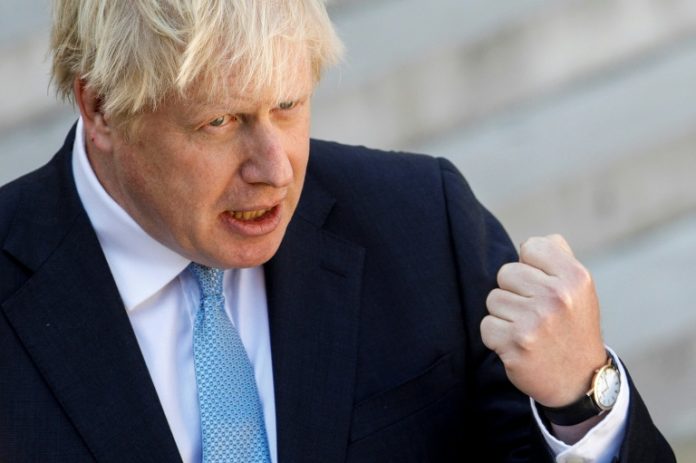Brexit talks between Britain and the European Union teetered on the brink of collapse on Tuesday, with tit-for-tat claims of intransigence and sabotage before an end of October deadline.
UK Prime Minister Boris Johnson spoke to German Chancellor Angela Merkel as he tried to salvage new divorce terms he has proposed ahead of next week’s pivotal EU summit in Brussels.
Unusually, Downing Street then provided a readout of what Merkel reportedly said, provoking an incendiary tweet from EU Council President Donald Tusk.
According to London, Merkel demanded a rewrite of Britain’s approach to the long-vexing Irish border problem that made a compromise “essentially impossible”.
The Downing Street official quoted Merkel as saying that a deal now looked “overwhelmingly unlikely”, and added that the Brexit talks were “close to breaking down”.
Britain has been trying for more than three years to find a way to deliver on the result of a 2016 referendum and end its almost five-decade involvement in the European bloc.

Riding a wave of British frustrations with the saga, Johnson is threatening to leave at any cost – with or without a withdrawal deal – on October 31.
In Berlin, Merkel’s office said it would not comment “on such confidential discussions”. Johnson’s official spokesman also declined to say anything about the substance of the call.
But he told reporters the pair had a “frank exchange” – diplomatic speak for a disagreement.
A frustrated Tusk accused Britain of playing with “the future of Europe and the UK” with no clear plan of what the country wanted.
Irish Foreign Minister Simon Coveney said he found it “hard to disagree” with Tusk, stressing that Dublin would “not strike a deal at any cost”.
He said Johnson had restated his wish of finding an agreement during a 40-minute phone call with his Irish counterpart Leo Varadakar.
But Varadkar later told broadcaster RTE he thought it would be “very difficult to secure an agreement by next week.”
The two are expected to meet for talks later this week, according to the Press Association.
EU chief negotiator Michel Barnier said late Tuesday “efforts continue” to reach a Brexit deal with Britain, after meeting with Coveney.
But much of the focus is shifting to what happens if the Brexit talks are formally pronounced dead.
The Irish government published a 2020 spending plan with a 1.2-billion-euro ($1.3 billion) relief fund based on the assumption that there will be no agreement.
On the markets, the pound slipped to its lowest value against the euro in about a month.
Johnson, who took over as PM from Theresa May in July, has been accused of political manoeuvring before calling a snap general election to strengthen his position in parliament.
On Tuesday, the government suspended the legislature from Wednesday until October 14, when Queen Elizabeth II will set out its legislative domestic agenda.
Johnson’s proposals outline a new way to avoid a hard border between EU member the Republic of Ireland and Northern Ireland after Brexit.
It would take the British province of Northern Ireland out of the EU’s customs union but keep it largely aligned with the bloc’s “single market” standards and regulations.

David Sassoli, president of the European Parliament, warned that the EU “will not agree to a deal that undermines the Good Friday Agreement and the peace process or compromise the integrity of our single market,” as he sounded a pessimistic note following a meeting with Johnson in London.
The 1998 Good Friday Agreement effectively created an invisible border between north and south, satisfying republicans who want a united Ireland and unionists who want to keep the status quo.
Finding a way to maintain the border open without keeping at least a part of the United Kingdom tied to EU trade rules has long been the main sticking point in the Brexit talks.
Downing Street officials say Brussels is making a big mistake because failure in the coming days to reach a deal would result in Britain’s position only hardening down the line.
One source in Johnson’s office told The Spectator magazine the government will try to “do all sorts of things” to prevent another Brexit delay should negotiations really collapse.
Scotland’s top civil court is due to rule Wednesday whether someone else – possibly a judge — could sign an extension request if Johnson fails to follow parliament’s order to ask for one if there is still no deal by October 19.
But should a delay still be granted at the EU summit, Johnson will campaign for a “no-deal” in any snap election, the Downing Street source told The Spectator.
















